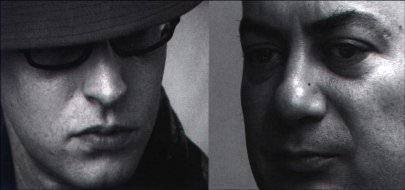
HIGH QAWWALI DUB
NEIL SPARKES, Renaissance dubstep, poet and painter is about to make the planet skank 'nuff big time with People's Colony No 1 - a collaboration between his band Temple Of Sound and Rizwan-Muazzam Qawwali.
Neill Sparkes does not stop moving. His restless journey started the moment he found himself onstage peptizing over the dub alongside Linton Kwesi Johnson, Jalal and Jean Binta Breeze. Since then there's been Real World Recording weeks, Transglobal Underground, the Temple of Sound project with his co-conspirator Count Dubulah of the mighty bass, solo albums like the resplendent Cuban dub vision of 'Burning Mask' ....and that's not even most of it.
So when Amanda Jones at Real World Works (Temple of Sound's publishers) asked for some demo tracks to send to Pakistan for Muazzam and Rizwan Ali Khan to listen to with a collaboration in mind, Neil was gagging for the opportunity for the cultures to refresh each other. He'd been in awe of the Qawwali sound and Sufi poetry, since he'd shared a bill with Nusrat Fateh Ali Khan in his Transglobal days.
"We stipulated from the start that it had to be a cultural exchange, not an instant welding job. We wanted to sit with them and develop a proper 50:50 working relationship built around their needs and ours."
The cultural flavours that the Temple of Sound duo brought to the table included Cuban (fiddle from Omar Puenta and Santeria rhythms from Kevin Hoynes on bota drums) and all manner of Dub and Nu-beats. An intuitive creative process evolved between the musicians so that East and West could develop a new music together.
"We might knock up a loose rhythm track, sometime reprogrammed around rhythm tracks from the masters of their first two albums, maybe with Western breakbeats added. Then we'd sit around in the big control room at Real World for a week, with Zafar (Ali Khan) the tabla player playing with or against the tracks and Rizwan and Muazzam working out harmony parts - Qawwali singing is very rhythmic and based on improvisation around structures, very close to jazz. So it's ideal for working with beats or dance music.
"We'd then go scuttling back into our programming suite, knock up some more bits and pieces based around what they'd been doing and then this thing would be bounced backwards and forwards....a system of referrals. Alternatively we might start with a vocal idea from them which we would record and then build around. Or we'd sit there clapping out rhythms or singing them back at each other. A really joyous experience!"
Do your body and your soul a favour, seek out and enjoy the luscious fruits of their labour.
Max Reinhardt
